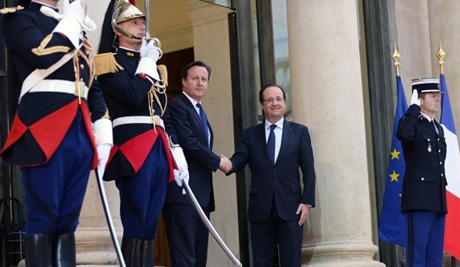23rd May 2013 Paris, France
The Prime Minister’s first visit to the Elysée

We’ve just had David Cameron, the British Prime Minister, in Paris for his first visit here to President Hollande since his election. They travelled down together from the European Council in the same train, and they were able to have a bilateral meeting as they were travelling.
Written version (continued)
The Prime Minister then went on to the Elysée for a press conference and a dinner with President Hollande. Just as they were arriving in Paris, we were getting the news of this awful killing in South London. And inevitably, the Prime Minister’s press conference was dominated by that issue. He made a very strong statement of condemnation, of condolence to the family and of determination that Britain will not be put on the back foot by terrorism of this kind. President Hollande spoke on very much the same lines expressing his solidarity with the UK.
But despite those very sad circumstances, and the fact that the Prime Minister had to return early to London to take charge of dealing with the crisis, the two leaders were able to have some very useful and wide-ranging talks. And what struck me, participating in those discussions, was how many issues we find between Britain and France where we agree and are working together.
That is true on the crisis agenda: Syria, for example, where we share the view that we must do all we can to promote the political process of a conference leading towards a transition away from the Assad regime, but also pressure to make that possible, which means amending the EU embargo on arms, to allow the option of supplying certain kinds of arms in due course to the moderate opposition members of the Syrian National Council. Britain and France absolutely agree on that approach.
The same is true on Mali, on Iran and all the world issues the two leaders are dealing with. We take the same approach as well on energy policy, and in particular the big opportunity of agreement between EDF and Britain on a new nuclear power station in the UK.
We see very much the same way as well the agenda for the G8 Summit, which the Prime Minister will host in the UK in June. And the two leaders were able to announce in their press conference that we will be working together on the issue of more automatic exchange of information on tax and on opening up more transparency in the way countries deal with each other. The two leaders announced that they will both be signing the Extractive Industries Transparency Initiative (EITI), which is designed to make sure that developing countries have as much information as possible about the activities of the big mining and other industries in their territories.
And then the two leaders spent also a lot of time talking about Europe and its future. They don’t agree on every issue there, but they do agree on the importance of doing everything to get growth and jobs building up in the European Union. So despite it being a very sad day in the UK, the two leaders were able to have a very useful and successful meeting.